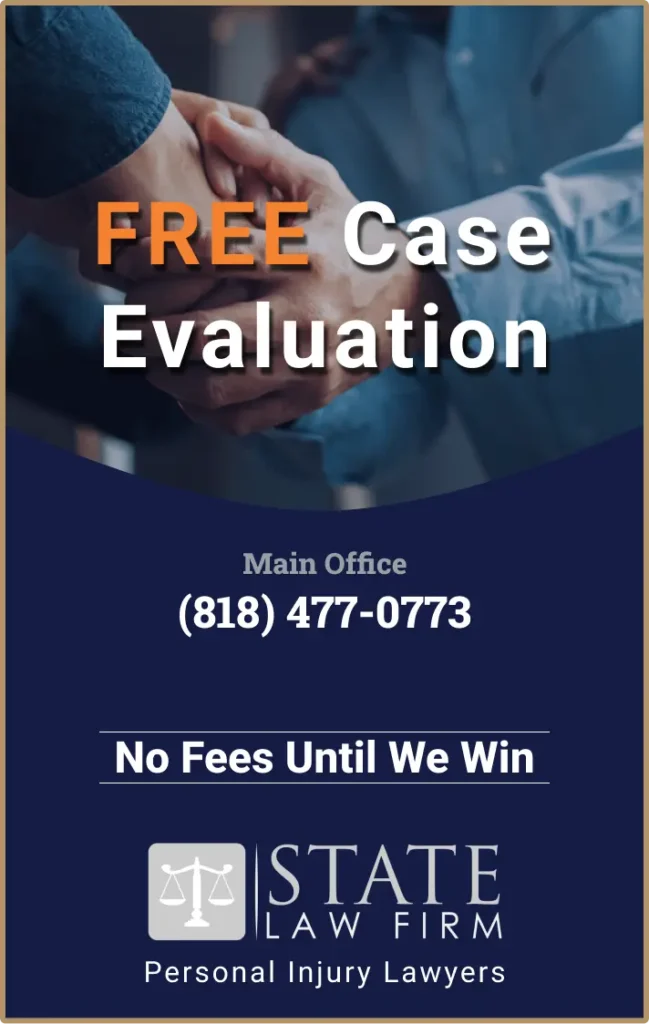Defective Products Lawyer
When you purchase a product, whether it’s a household appliance, a vehicle, or a toy, you have the right to expect that it will function safely and as advertised. Unfortunately, defective products can sometimes slip through the cracks, posing serious risks to consumers. This is where our defective products lawyer steps in – to advocate for your rights, hold manufacturers accountable, and ensure you receive the compensation you deserve.
According to a report from the U.S. Consumer Product Safety Commission, an estimated 206,400 toy-related injuries were treated in U.S. hospital emergency departments in 2021. Children experienced harm, including cuts, damage to the eyes, and instances of asphyxiation due to inadequately crafted toys. Teens and adults are injured by poorly manufactured vehicles, medications and medical devices, tools, appliances, electronics, sports equipment, clothing, cosmetics, and so much more.
Defective Products Lawyer: Unraveling Their Role
Our defective products lawyers specialize in cases involving injuries, property damage, or financial losses resulting from using faulty or dangerous products. They possess an intricate understanding of product liability laws and work diligently to build compelling cases on behalf of consumers.
What Falls Under Product Liability?
Product liability refers to the legal responsibility manufacturers, distributors, and sellers hold for placing defective products into the hands of consumers. Defective products can result from design flaws, manufacturing errors, or inadequate warnings.
To get in touch, just give us a shout at (818) 477-0773, or go ahead and fill out a FREE Case Evaluation form.
What are the Three Main Types of Faults in Manufactured Items?
The three main types of faults in manufactured items are design defects, manufacturing defects, and marketing defects. These types of faults can result in unsafe products that pose risks to consumers. Let’s explore each type in more detail:
Design Defects: Design defects occur when there is an inherent flaw in the product’s design that makes it dangerous even if it is manufactured correctly. In other words, the product’s design itself is unsafe. Design defects can affect a whole line of products, as the issue is rooted in the blueprint or concept. Examples of design defects include:
- A car model with a tendency to roll over easily due to a high center of gravity.
- A children’s toy with small parts that can detach, posing a choking hazard.
- A household appliance with inadequate safety features increases the risk of electric shock.
Manufacturing Defects: Manufacturing defects occur during the production process when a product is not made according to its intended design. These defects can affect a single product or a batch of products. Manufacturing defects can occur due to errors, oversights, or substandard materials during manufacturing. Examples of manufacturing defects include:
- A batch of medication contaminated with incorrect ingredients during production.
- A bicycle with a poorly welded frame may break under stress.
- A cell phone with a malfunctioning battery due to a manufacturing error.
Marketing Defects (Failure to Warn): Marketing defects involve inadequate warnings, instructions, or labeling that fail to alert consumers about potential risks associated with the product’s use. Even if the product’s design and manufacturing are flawless, if consumers are not adequately informed about its safe usage, they can be put at risk. Examples of marketing defects include:
- Medication packaging that fails to mention potential side effects or interactions.
- Chemical products lacking proper instructions for safe handling and storage.
- Tools without warnings about the proper protective gear required during use.
Identifying the specific type of fault is important in product liability cases, as it helps determine the liability of the parties involved and the appropriate legal course of action. Whether it’s a design defect, a manufacturing defect, or a marketing defect, consumers have the right to hold manufacturers, distributors, and sellers accountable when their products cause harm due to these faults.
Common Injuries Caused By Defective Products
Defective products can lead to a wide range of injuries, often resulting in physical harm, emotional distress, and financial burdens for the victims. These injuries can vary in severity, from minor discomfort to life-altering consequences. Here are some common types of injuries that can be sustained from defective products:
- Burns and Scalds: Products with faulty wiring, overheating components, or inadequate safety measures can lead to burns and scalds. Examples include defective electronics, appliances, and heating systems.
- Cuts and Lacerations: Poorly designed or manufactured products may have sharp edges or components that break unexpectedly, causing cuts, lacerations, or puncture wounds. This can include items like kitchen utensils, tools, or even toys.
- Choking and Suffocation: Defective toys, children’s products, or items with small parts that can detach pose a significant risk to infants and young children who might accidentally swallow or inhale these components.
- Broken Bones and Fractures: Products that collapse or break unexpectedly, such as furniture or equipment, can lead to falls and result in broken bones, fractures, and sprains.
- Traumatic Brain Injuries (TBIs): Defective helmets, safety gear, or other protective equipment can fail to provide the intended protection, leading to head injuries like concussions or more severe TBIs.
- Electrocution: Products with faulty wiring or inadequate insulation can expose users to electric shocks and electrocution, causing serious injuries or even death.
- Poisoning: Defective food packaging, containers, or household products can lead to accidental ingestion of harmful substances, resulting in poisoning and severe health complications.
- Respiratory Issues: Defective household items like air purifiers, humidifiers, or heating systems can release harmful particles or gases, causing respiratory problems and exacerbating existing conditions.
- Joint and Muscle Injuries: Faulty exercise equipment, furniture, or products lacking proper ergonomic design can contribute to strains, sprains, and joint injuries.
- Vision and Eye Injuries: Defective eyewear, protective goggles, or products that shatter upon impact can cause eye injuries ranging from minor irritation to permanent damage.
- Allergic Reactions: Defective cosmetics, personal care products, or clothing made from allergenic materials can trigger skin rashes, hives, and severe allergic reactions.
- Infections: Products that harbor bacteria due to poor manufacturing processes or materials can lead to infections when they come into contact with the skin or body.
- Emotional Distress: Injuries caused by defective products can result in emotional trauma, anxiety, and stress, impacting the victim’s mental well-being.
- Amputations: Industrial or mechanical products lacking proper safety mechanisms can lead to serious accidents, sometimes resulting in the need for amputations.
It’s essential to understand that injuries from defective products can range widely, and the consequences can be devastating. If you’ve experienced harm due to a faulty product, consulting with State Law Firm and our defective products lawyer can help you navigate the legal process and seek compensation for your injuries.
Who Can a Victim Sue in a Product Liability Case?
When dealing with defective products, several parties along the supply chain can potentially be held liable for the injuries or damages caused by these products. Depending on the circumstances and the nature of the defect, you may be able to sue one or more of the following entities:
- Manufacturers: The primary party that can be held responsible for defective products is the manufacturer. This includes both the company that designed the product and the one that produced it. If the defect is a result of design flaws, manufacturing errors, or inadequate quality control, the manufacturer may be held liable.
- Distributors and Wholesalers: Companies involved in distributing and wholesaling products have a duty to ensure that the items they are selling are safe for consumers. If they were aware of a defect and continued to distribute the product, they could also be held accountable.
- Retailers and Sellers: Retailers that sell defective products can also face legal consequences. Even if they didn’t manufacture the product, they have a responsibility to provide safe products to their customers. Retailers may be held liable for negligence, failure to warn customers about potential hazards, or misrepresentation of the product’s safety.
- Designers and Engineers: If a defect in a product can be traced back to the initial design or engineering phase, the individuals or teams responsible for the design may be held liable. This could include flaws that make the product inherently dangerous or prone to malfunction.
- Component Manufacturers: In cases where a product is composed of various components, such as electronics or automotive parts, the manufacturers of these components could be held liable if their parts contributed to the overall defect.
- Third-Party Testers and Inspectors: If the defect could have been identified through proper testing and inspection, third-party testing and inspection companies might share liability if they failed to detect the issue.
- Advertisers and Marketers: Companies that promote or market a defective product without disclosing potential risks or hazards could be liable for false advertising or misrepresentation.
- Property Owners and Landlords: In cases involving defective products within rental properties, landlords or property owners may share liability if they were aware of the defect and did not take appropriate action to rectify it.
It’s important to note that the specific circumstances of each case determine who can be held legally responsible. Liability can vary depending on state laws, the nature of the defect, the type of product, and the actions or negligence of each party involved. If you’ve been harmed by a defective product, consulting with a skilled defective products lawyer can help determine the parties you may have grounds to sue and build a strong case for seeking compensation.
Who Can Bring a Cause of Action for Defects in California?
In California, individuals who have been harmed by defective products have the right to bring a cause of action (legal claim) against the responsible parties. The term “cause of action” refers to the legal basis on which a plaintiff (the injured party) can sue the defendant (the manufacturer, distributor, or seller) for damages resulting from the defective product. Here’s an overview of who can bring a cause of action for defects in California:
- Injured Consumers: The primary group of individuals who can bring a cause of action for defects in California are consumers who have been directly harmed by the defective product. If you purchased a product that was inherently dangerous due to design flaws, manufacturing defects, or inadequate warnings, and you suffered injuries or damages as a result, you have the right to file a lawsuit against the responsible parties.
- Users and Consumers: Even if you didn’t purchase the product directly, if you were a user of the defective product and suffered injuries or damages, you might still have grounds to bring a cause of action. This can apply to cases where a product was loaned, leased, or used in a public setting.
- Bystanders and Family Members: In certain circumstances, bystanders who witness the harm caused by a defective product or family members of the injured party may also have the right to bring a cause of action. For example, if a defective product injures a child, the child’s parents or legal guardians may have legal standing to sue for damages.
- Estate Representatives: If a defective product causes fatal injuries, the representative of the deceased person’s estate (usually an executor or administrator) may bring a wrongful death lawsuit against the responsible parties. This can seek compensation for the financial losses and emotional distress suffered by the surviving family members.
Can I Bring a Claim Even If I Wasn’t the One Who Bought The Defective Product
Yes. It’s again important to note that someone who wasn’t the original purchaser of the defective product can bring a claim. California’s product liability laws recognize the potential for harm to extend beyond the immediate purchaser, encompassing users, bystanders, and family members affected by the defective product.
Example: Imagine a scenario where John buys a brand-new bicycle for his son, Mark, as a birthday gift. Mark takes the bicycle out for a ride, and while he’s going downhill, he realizes that the brakes aren’t working properly. Unfortunately, Mark loses control of the bicycle and crashes into a tree, sustaining serious injuries.
In this situation, Mark, who wasn’t the original purchaser of the bicycle, can still bring a claim against the manufacturer or seller of the bicycle. Even though John bought the bicycle, Mark suffered harm directly because of the defective brakes. The focus is on the dangerous condition of the product and the injuries it caused, not on who bought the bicycle. Mark has the right to seek compensation for his injuries, medical expenses, pain, and suffering, despite not being the one who initially purchased the bicycle.
This example illustrates how the principle of strict liability allows individuals who are harmed by defective products to bring claims for damages, even if they weren’t the original purchasers of those products. The law prioritizes consumer safety and holds responsible parties accountable for the harm caused by their defective products.
If you believe you have been harmed by a defective product or have lost a loved one due to a defective product, consulting State Law Firm and our experienced defective products lawyer is important. We can evaluate the specifics of your situation, determine the appropriate parties to sue, and guide you through the legal process to seek the compensation you deserve.
What Are the California Product Liability Laws
California has a robust set of product liability laws in place to protect consumers from the dangers posed by defective products. These laws establish the legal framework for holding manufacturers, distributors, and sellers accountable for injuries or damages caused by their products. Here’s an overview of the key aspects of product liability laws in California:
- Strict Liability Doctrine: California operates under the doctrine of strict liability in product liability cases. This means that a plaintiff (the injured party) does not need to prove negligence on the part of the defendant (the manufacturer, distributor, or seller) to establish liability. Instead, the plaintiff must demonstrate that the product was defective and that the defect caused the injury.
- Types of Defects: Product liability cases in California can be based on three types of defects: design defects, manufacturing defects, and marketing defects. Design defects involve inherent flaws in the product’s design, making it dangerous even when manufactured correctly. Manufacturing defects occur when a product is not made according to its intended design, rendering it unsafe. Marketing defects involve inadequate warnings, instructions, or labeling, which can lead to improper use or unawareness of potential hazards.
- Breach of Warranty: Consumers in California are also protected by implied and express warranties. An implied warranty is an automatic guarantee that a product will function as intended, even if not explicitly stated. An express warranty is a specific promise made by the manufacturer or seller regarding the product’s quality or performance.
- Statute of Limitations: In California, there’s a statute of limitations for filing product liability lawsuits. Generally, a plaintiff has two years from the date of injury to file a claim. However, there are exceptions and variations depending on the circumstances, so consulting with a lawyer is essential to understand the time limits that apply to your case.
- Comparative Fault: California follows the doctrine of comparative fault, which means that if the plaintiff’s own negligence contributed to their injuries, the damages awarded may be reduced in proportion to their level of fault. As long as the plaintiff is less than 100% responsible, they can still recover damages.
- Economic and Non-Economic Damages: In a successful product liability case, the plaintiff may be entitled to various types of damages, including economic damages (such as medical expenses and lost wages) and non-economic damages (such as pain and suffering).
- Punitive Damages: In cases involving intentional misconduct, fraud, or gross negligence on the part of the defendant, punitive damages may be awarded. These damages are meant to punish the defendant and deter similar behavior in the future.
Navigating California’s product liability laws can be complex, especially when dealing with the nuances of different types of defects and liability factors. If you believe you have a product liability case, it’s important to consult with State Law Firm and our experienced defective products lawyer, who can assess the details of your situation and guide you through the legal process to ensure your rights are protected, and you receive the compensation you deserve.
The Expertise You Can Trust at State Law Firm
When facing a legal battle against powerful corporations, having an experienced defective products lawyer by your side can make all the difference.
In-depth Knowledge of Product Liability Laws
Our defective products lawyers are well-versed in intricate product liability laws. We leverage this knowledge to pinpoint areas of negligence and establish a strong case.
Extensive Investigative Skills
Our lawyers employ skilled investigators who delve into the product’s design, manufacturing process, and any history of recalls. This helps identify the responsible parties and strengthens your case.
Negotiation Prowess
Before heading to court, many defective products cases are settled through negotiation. Our lawyers are skilled in negotiation and can secure fair compensation without the need for a lengthy trial.
Litigation Expertise
In cases that require litigation, our defective products lawyers demonstrate their prowess in the courtroom. They present compelling arguments, cross-examine witnesses, and ensure your side of the story is heard.
The Defective Products Lawyer’s Journey: From Consultation to Compensation
Initial Consultation at State Law Firm
Your journey with our defective products lawyer begins with an initial consultation. During this meeting, you’ll discuss the details of your case, including the product in question, the damages or injuries incurred, and any evidence you may have.
Case Evaluation
After the consultation, our team will conduct a thorough case evaluation. This involves gathering evidence, consulting experts if necessary, and determining the viability of your claim.
Legal Strategy
Once we have a clear understanding of your case, we will devise a legal strategy tailored to your situation. This may involve negotiation, mediation, or preparing for trial.
Negotiation and Settlement
If the opposing party is willing to negotiate, your lawyer will enter into discussions to reach a fair settlement. They will advocate for your best interests, ensuring you receive appropriate compensation for your losses.
Trial Preparation and Representation
In the event that a settlement cannot be reached, your defective products lawyer will prepare for trial. This includes building a strong case, gathering witnesses, and developing persuasive arguments.
Courtroom Advocacy
During the trial, your lawyer will present your case in court, cross-examine witnesses, and counter opposing arguments. Our goal is to secure a favorable judgment that compensates you for the damages you’ve suffered.
Where Can I Get Information on Recalls and Product Defects
Finding information about recalls and product defects is important for staying informed about potential hazards associated with products you own or are considering purchasing. Here are some reliable sources where you can get information on recalls and product defects:
- Consumer Product Safety Commission (CPSC): The CPSC is a U.S. government agency that provides information on recalls, product safety alerts, and news related to consumer products. Their website offers a searchable database of recalls and safety information. Website: www.cpsc.gov
- National Highway Traffic Safety Administration (NHTSA): If you’re looking for information on vehicle recalls and defects, the NHTSA is the authoritative source. They provide details about vehicle safety, recalls, and complaints related to automotive products. Website: www.nhtsa.gov
- Food and Drug Administration (FDA): For recalls and safety alerts related to food, drugs, medical devices, and cosmetics, the FDA offers a comprehensive database. This is particularly useful for staying informed about potential health risks. Website: www.fda.gov
- Recalls.gov: This website is a collaborative effort of various U.S. government agencies and departments, offering a centralized platform for recalls across different product categories. It provides links to the relevant agency responsible for the recall. Website: www.recalls.gov
- Manufacturer Websites: Manufacturers often post recall information on their websites, including details about specific products affected, reasons for the recall, and steps for consumers to take.
- Retailer Websites: Major retailers also typically share information about recalls on their websites, especially if they’ve sold the affected products.
- News Outlets: News organizations often cover recalls and product defects. Subscribing to consumer-focused news outlets or visiting their websites can provide you with the latest information.
- Social Media: Government agencies, manufacturers, and consumer advocacy groups frequently share recall information on social media platforms like Twitter, Facebook, and Instagram.
- Consumer Protection Organizations: Organizations like Consumer Reports and the Consumer Federation of America provide information and resources about product recalls and defects.
- Publications from Consumer Advocacy Groups: Many organizations focused on consumer rights and safety release publications and guides that cover product recalls and defects.
Remember that staying informed about recalls and product defects is important for your safety and the safety of your loved ones. Regularly checking these sources and signing up for alerts when possible can help you stay up-to-date on potential risks associated with the products you use or are considering purchasing.
A Product Liability Law Firm
When confronted with the consequences of a defective product, you don’t have to navigate the legal complexities alone. At State Law Firm, we bring expertise, experience, and dedication to your case, ensuring your rights are upheld, and you receive the compensation you deserve. From consultation to resolution, these legal professionals are your advocates, committed to securing justice in the face of corporate negligence.
If you’re ready to protect your consumer rights and seek justice, enlist the help of our skilled defective products lawyer today by calling State Law Firm (818) 477-0773
FAQs About Defective Products Lawyers
Can I Afford to Hire a Defective Products Lawyer?
Absolutely. You only pay when we win your case, making legal representation accessible to you and everyone.
What If I’m Injured by a Defective Product?
If you’ve suffered injuries due to a defective product, a lawyer can help you pursue compensation for medical expenses, pain and suffering, and other related damages.
How Long Will My Case Take to Resolve?
The duration varies, but straightforward cases might settle within a few months. More complex cases that go to trial can take longer. Your lawyer will provide a realistic timeframe based on the specifics of your case.
Can I Handle a Defective Product Claim Without a Lawyer?
While it’s possible, navigating the legal intricacies alone can be challenging. An experienced lawyer increases your chances of obtaining fair compensation and ensures your rights are protected.
What If I Can’t Prove the Product Was Defective?
A skilled defective products lawyer will collaborate with experts to examine the product and establish its defectiveness. They’ll gather evidence to support your claim even if you can’t initially prove it yourself.
Will I Have to Go to Court?
Not necessarily. Many cases are settled outside of court through negotiation or mediation. However, if a fair settlement cannot be reached, your lawyer will be fully prepared to represent you in court.




